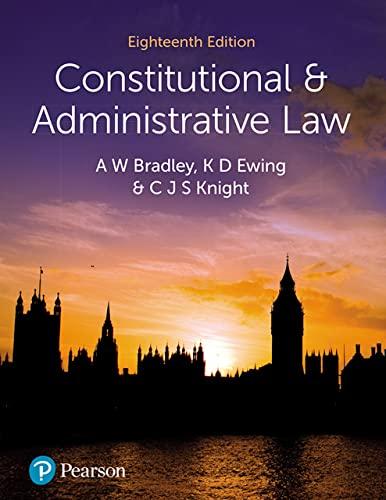Question
involves Constitutional law. Case 1 The State of Kansas decides that landfills in Kansas are becoming too full of waste too quickly. In response, the
involves Constitutional law.
Case 1
The State of Kansas decides that landfills in Kansas are becoming too full of waste too quickly. In response, the Kansas legislature passes a statute called theClean Up Our Act Initiative that bans the importation of any out-of-state waste into landfills in Kansas.
Dewey's Rubbish Solutions, Inc., operates three landfills in Kansas that have contracts to accept out-of-state waste. Dewey's files a lawsuit arguing that theClean Up Our Act Initiative violates the Commerce Clause of the U.S. Constitution.
Question 1:
How is the court likely to decide this case? Fully explain your reasoning.
Case 2
Until very recently, in the State of Louisiana, three types of gambling businesses were all subject to a state tax of 15%. This included (1) land-based casinos, (2) horse and dog racetracks, and (3) riverboat gambling establishments.
Louisiana wanted to increase state tax revenues, so the Louisiana legislature just passed a statute called theHigh Water Solution, which increased the state tax on riverboat gambling establishments to 45%.
Auntie Belle's Riverlife Excursions, LLC, operates two riverboat gambling establishments in Louisiana. Auntie Belle's, and other operators of riverboat gambling establishments in Louisiana, file a lawsuit against the Sate of Louisiana claiming that theHigh Water Solution violates their Equal Protection rights.
Question 1:
What legal test will the court use to resolve this issue?
Question 2:
What does this test require?
Question 3:
Applying the law to these facts, what should the court decide and why? Fully explain your analysis.
Case 3
The city of Atlanta, Georgia enacted an ordinance that imposes significant restrictions on the installation of outdoor advertising within the city. The express objectives of the ordinance are:
(1) "to eradicate risks to motorists and other citizens caused by potentially distracting outdoor advertising," and,
(2) "to maintain and enhance the attractiveness of Atlanta."
The ordinance allows certain commercial advertising (signs advertising products obtainable at the location where the sign is placed), but outlaws other types of outdoor advertisements, both commercial and noncommercial, unless expressly allowed by one of the ordinance's 10 stated exclusions, such as impermanent political election signs.
Big Albert's Big Adverts, LLC, and other organizations involved in the advertising business in Atlanta when the ordinance was enacted, sued the city alleging that the outdoor advertising ordinance was an unconstitutional violation of their First Amendment free speech rights. They sought an injunction against enforcement of the ordinance.
The trial court determined that the ordinance was an unconstitutional violation of Big Albert's First Amendment rights. The Georgia Court of Appeals affirmed, but the Georgia Supreme Court reversed, holding, among other things, that the ordinance was not invalid under the First Amendment. Big Al's and the other companies appeal to the United States Supreme Court and the Court agrees to hear the case.
Question 1:
What legal test will the court use to resolve this issue?
Question 2:
What does this test require?
Question 3:
Applying the law to these facts, what should the court decide and why? Fully explain your analysis.
Step by Step Solution
There are 3 Steps involved in it
Step: 1

Get Instant Access to Expert-Tailored Solutions
See step-by-step solutions with expert insights and AI powered tools for academic success
Step: 2

Step: 3

Ace Your Homework with AI
Get the answers you need in no time with our AI-driven, step-by-step assistance
Get Started


